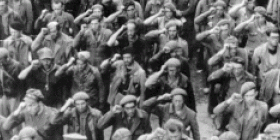The Revolutionary Syndicalist Committees in Spain - The history of the revolutionary syndicalist tendency of the CNT (1919-1925) - Comités Syndicalistes révolutionnaires
An account of the rise and fall of the CNT’s Revolutionary Syndicalist tendency—said to reflect the “original” orientation of the CNT of 1910-1918, modeled on the CGT and the "Charter of Amiens", as opposed to the “sectarian” anarchosyndicalist “deviation” that first arose in the CNT in 1919 as a result of the post-war crisis—featuring the “Declaration of Principles” and “Manifesto” of the Revolutionary Syndicalist Committees (founded in 1922), and discussions of the debates in the CNT concerning the Russian Revolution, the Third International, the Red Trade Union International, how to respond to repression, the question of violence, and the campaign for the trade union united front.
Anarchism and syndicalism - Salvador Seguí
A speech delivered in prison in 1920 by Salvador Seguí, a major, and complex, figure in the early history of the CNT: a proponent of alliances with other trade union and political groups, yet also a militant strike leader who spent years of his life behind bars; an opponent of unconditional membership in the Red Trade Union International in 1919, yet also a supporter of the CNT’s 1922 Zaragoza Declaration, according to which the “totally revolutionary” CNT is “absolutely political” by virtue of its far-reaching social goals; an advocate of more intellectual training for trade union militants and a harsh critic of the increasingly more popular exemplary actions, he was assassinated in 1923.
Rudolf Rocker: anarchist missionary (1873-1958) - W.J. Fishman
1972 oral history with Sam Dolgoff
An Interview with Miguel Amorós – Cazarabet-El Sueño Igualitario
In this 2015 interview, Miguel Amorós discusses his book about Buenaventura Durruti, Durruti in the Labyrinth (2006), the controversies and enigmas surrounding the untimely and mysterious death of this charismatic figure of anarchism, and the impact of his death on the anarchosyndicalist movement in Spain during the civil war, which Amorós says was not dependent on the actions of any single individual, but that his demise demoralized the rank and file of the anarchist movement and reinforced the trend towards bureaucratization in the CNT-FAI by providing those institutions with a martyr for propaganda purposes to rally the masses behind the war and government collaboration.
Workers' autonomy, anarchosyndicalism, anarchism - Miguel Amorós
A brief overview of the core principles of some of the major working class movements of the last two hundred years, emphasizing their different historical and social contexts as well as the features they had in common, with lapidary critiques of the failures and shortcomings of each tendency when its hour arrived (revolutionary syndicalism, France: August 1914; Workers Councils, Russia: 1917-1921, Kronstadt; Factory Councils, Italy: March 1921, Turin; anarchosyndicalism and anarchism, Spain: 1936-1939, government collaboration), but reaffirming that “there is one aspect of anarchism that remains untarnished, the rejection of authority, of politics and of the State”.
Revolution and counterrevolution in Catalonia - Carlos Semprún Maura
First published in France in 1974, a “critical analysis of the bureaucratization of the CNT, with regard to both the political as well as the economic terrain”, bureaucratization which the author claims was “total and complete”, with discussions of certain historical turning points and watershed moments (e.g., the militarization of the militias, the May Events and the overthrow of the Council of Aragon), and extensive passages quoted from eyewitness accounts (e.g., Marcel Ollivier’s Les journées sanglantes de Barcelone), newspaper articles and official documents that have not previously appeared in English translation.
The Spanish Anarchists: The Heroic Years, 1868-1936
The seminal history of Spanish anarchism: from its earliest inception to the organizations that claimed over two million members on the eve of the 1936 Revolution. It has been hailed as a masterpiece.
Ready to fight: Developing a 21st century community syndicalism
The CNT in the Spanish revolution, volume 2
Second volume of José Peirats' extensive work on the Spanish anarchist union the CNT, which in this volume focuses on the battles raging at both the front and rear guards. Additionally, a biographical chapter, "The Life and Struggles of José Peirats" gives a great deal of insight into this CNT fighter and historian.













 Can comment on articles and discussions
Can comment on articles and discussions